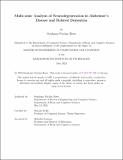Multi-omic Analysis of Neurodegeneration in Alzheimer’s Disease and Related Dementias
Author(s)
Howe, Stephanie Pui-kay
DownloadThesis PDF (22.40Mb)
Advisor
Kellis, Manolis
Terms of use
Metadata
Show full item recordAbstract
The advent of single cell sequencing has revolutionized the granularity at which we can understand genetics and underlying cell biology. This enables us to analyze both the transcriptome and epigenome of various tissues, offering new insights into the molecular mechanisms that underlie disease such as neurodegeneration. This study focuses on neurodegenerative disease at the single cell resolution of the following proteinopathies: Alzheimer’s Disease (AD), Frontotemporal Dementia (FTD), Lewy Body Dementia (LBD), and Vascular Contributions to Cognitive Impairment and Dementia (VCID). We utilize both single-cell RNA sequencing (scRNA-seq) and single-cell ATAC sequencing (scATAC-seq) to perform a joint analysis of these conditions, examining both modalities holistically. Our research characterizes a multi-omic data set comprising 2,820,565 cells from 491 samples of prefrontal cortex across the aforementioned conditions, with all samples subjected to scRNA-seq and 63 to scATAC-seq. Leveraging this data, we conduct a multi-omic analysis of Alzheimer’s Disease and Related Dementias (ADRD) by exploring differences in the transcriptome and epigenomic erosion profile across conditions, shedding light on the intricacies of cortical aging. Ultimately, we identify potential molecular and genetic markers that drive the heterogeneous relationship between pathology, epigenetic erosion, and cognition in individuals affected by these conditions.
Date issued
2024-05Department
Massachusetts Institute of Technology. Department of Electrical Engineering and Computer Science; Massachusetts Institute of Technology. Department of Brain and Cognitive SciencesPublisher
Massachusetts Institute of Technology